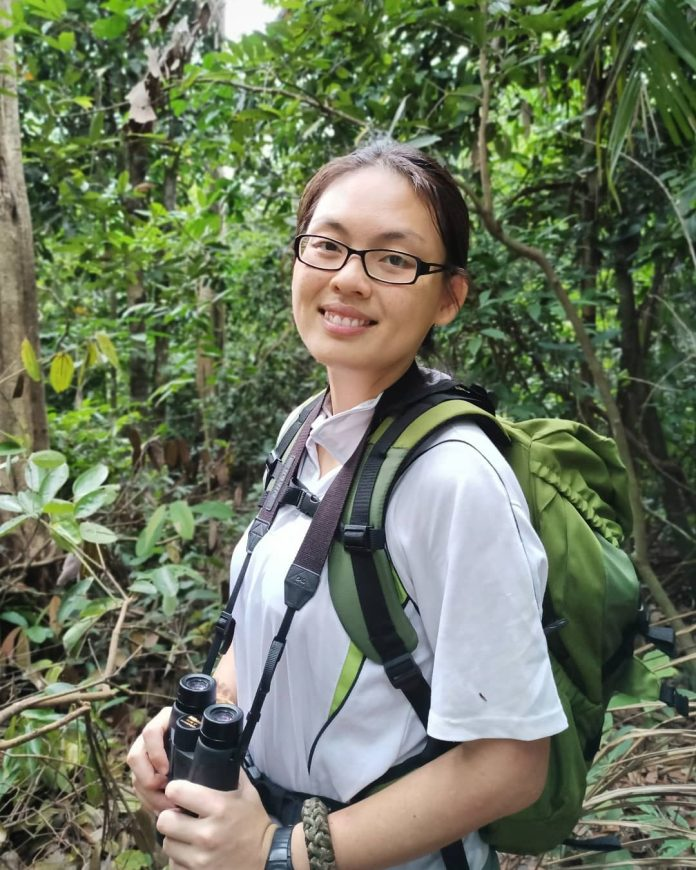
WHEN you have two distinct loves – the environment and community, there is one way to connect the two – through science communication.
This is what a FameLab alumna is doing now. Yap Jo Leen, who is at the tail end of completing PhD in zoology and especially studied dusky langurs (Trachypithecus obscurus) or dusky leaf monkeys as a specialty is now creating awareness, mainly among children on how to conserve this endangered primate.
Jo Leen plays an instrumental role in conserving endangered dusky langurs in Malaysia as they are frequent victims of vehicle collisions while they cross the roads. The dusky langur is an endangered species under the IUCN Red List. Inspired by her love to communicate science coupled with her love for the environment, has fueled Jo Leen’s initiative to establish the Langur Project Penang (LPP) in 2016. The project focuses on conserving this species of primate.
Although Jo Leen has been an environmental educator since 2013, she says that the FameLab competition has turned her into a skillful communicator.
“I became more confident and pitched proposals to different stakeholders as I learned to frame my science message effectively through the competition”, said the first runner-up of FameLab Malaysia 2019.
FameLab is one of the largest science communication competitions in the world which identifies stars in the science world who could effectively speak on their scientific project or area of expertise in a fascinating and engaging way in just three minutes.
Jo Leen and her team are now working to conserve dusky langurs through research by understanding their behavior, ecology, and diet. LPP builds canopy bridges to reduce fatalities caused by accidents. Environmental education is then developed based on the research outcome. One of their flagship projects is establishing the first road canopy bridge in Penang in 2019 for the arboreal/treetop wildlife to move around their habitat safely without having to cross the roads.
Jo Leen’s day job is working towards her PhD as she has successfully converted her Master of Zoology into PhD at University Sains Malaysia (USM). She was cajoled to take part in FameLab when she saw the video of Dr Siti Khayriyyah Mohd Hanafiah in USM who won FameLab International in 2018. Jo Leen was encouraged by both of her PhD supervisors to take part in the competition.
Jo Leen perceives FameLab as a window of opportunity to engage with the public about her urban canopy bridge project and dusky langur after meeting the International Champion.
She further describes the masterclass she attended in Kuala Lumpur as something that helped to boost her confidence to engage with the public.
“British Council Malaysia and Malaysian Industry-Government Group of High Technology (MIGHT) has done a great job in bringing science communicators from different fields to one intersection point.
“It was a great opportunity to bond with people from various fields during the masterclass”, Jo Leen said.
She added that she met great mentors during the camp who gave her a broader perspective on science communication. Through FameLab she realised that there is an interest in science among Malaysians.
“FameLab has reinforced my storytelling skills tremendously and it is helping me to bridge the gap between wildlife and humans”, she says.
She proved herself as an enthusiastic and versatile science communicator by tuning her storytelling skills into a form of art.
In early 2021, LPP collaborated with the Penang State Art Gallery to organise, Langur: Building Bridges Between Our Worlds where artworks featuring dusky langur were showcased.
A narrative on the life cycle of dusky langur and the threat it faces were emphasised. She added that working on the narrative of the presentation is a skill that she gained from the competition.
Jo Leen affirms that science is actually more than what is learned to pass exams as it is embedded in our daily life. “We have been communicating science for a long time without knowing it”, said the wildlife researcher. She says FameLab allows this communication to be done consciously using skills that will captivate the audience and get them into action.
Being an environmental educator, establishing an education hub is also part of her vision to allow closer interactions as more people are needed in the field of conversation. She envisages that awareness should start from a young age.
“The skills I gained from the competition helped me to be more versatile in my presentations to match the different target audiences”, elaborates the environmental educator.
Alongside Ammi, a children book illustrator, she has also published a children’s picture book, “A Friend of Dusky Langur” to engage with children.
She added that FameLab showed her all possible ways to diversify her science communication skills. Thus, she would continue the legacy of FameLab through her public engagement.
“Anyone can be an effective science communicator in many possible ways”, says the proud FameLab alumna.
EndNote
In partnership with the Malaysian Industry-Government Group for High Technology (MIGHT), 2021 was the seventh and final year British Council is hosting the FameLab Malaysia competition. The British Council will celebrate the partnership and achievements in April and May 2022 to draw this successful partnership to a close, handing over FameLab Malaysia to MIGHT. MIGHT will continue to run FameLab Malaysia together with Cheltenham Festivals, the creator of FameLab in the UK.
While the British Council has ceased running FameLab, science communication remains to be part of outreach and public engagement programmes under the enabling pillar of Going Global Partnerships.
Article originally published in: https://thepetridish.my/2022/05/14/famelab-science-communicator-wants-to-save-tree-leaf-primates/